Former British diplomat Craig Murray was in the public gallery at Old Bailey for Julian Assange’s hearing and here is his report on Monday’s bizarre events.
By Craig Murray
CraigMurray.org.uk
 Things became not merely dramatic in the Assange courtroom today, but spiteful and nasty. There were two real issues, the evidence and the procedure.
Things became not merely dramatic in the Assange courtroom today, but spiteful and nasty. There were two real issues, the evidence and the procedure.
On the evidence, there were stark details of the dreadful regime Julian Assange will face in U.S. jails if extradited.
On the procedure, we saw behavior from the prosecution Queen’s Counsel that went well beyond normal cross examination and was a real attempt to denigrate and even humiliate the witness. I hope to prove that to you by a straightforward exposition of what happened today in court, after which I shall add further comment.
Today’s witness was Eric Lewis. A practicing U.S. attorney for 35 years, Lewis has a doctorate in law from Yale and a masters’ in criminology from Cambridge. He is former professor in law at Georgetown University, an elected member of both the American Law Institute and the Council on Foreign Relations and a fellow of the American Bar Foundation. He is chairman of Reprieve, an international human rights group focused on the death penalty and other human rights abuses. He has represented high profile clients in national security and terrorism cases, including the journalist Seymour Hersh and Guantanamo Bay internees.
Lewis had submitted five statements to the court, between October 2019 and August 2020, addressing the ever changing indictments and charges brought by the prosecution. He was initially led through the permitted brief half hour summary of his statements by defence QC Edward Fitzgerald. (I am told I am not currently allowed to publish the defence statements or links to them. I shall try to clarify this tomorrow).
The New York Times Problem

The New York Times Building, Manhattan. (Defears, CC BY-SA 4.0, via Wikimedia Commons)
Eric Lewis testified that no publisher had ever been successfully prosecuted for publishing national security information in the USA.
Following the WikiLeaks publications — including the diplomatic cables and the Iraq and Afghanistan war logs — Assange had not been prosecuted because the First Amendment was considered insuperable and because of The New York Times problem — there was no way just to prosecute Assange without prosecuting The Times for publishing the same material.
The New York Times had successfully pled the First Amendment for its publication of the Pentagon Papers, which had been upheld in a landmark Supreme Court judgement.

Mark Feldstein.

Trevor Timm.

Paul Rogers.
Lewis here gave evidence that mirrored that already reported of Professor Mark Feldstein, Trevor Timm and Professor Paul Rogers, so I shall not repeat all of it.
He said that credible sources had stated the Obama administration had decided not to prosecute Assange, notably Matthew Miller, a highly respected Justice Department figure who had been close to Attorney General Eric Holder and would have been unlikely to brief the media without Holder’s knowledge and approval.
Eric Lewis than gave testimony on the change of policy towards prosecuting Assange from the Trump administration. Again this mostly mirrored the earlier witnesses.
He added detail of U.S. Secretary of State Mike Pompeo stating the the free speech argument for WikiLeaks was “a perversion of what our great country stands for,” and claiming that the First Amendment did not apply to foreigners.
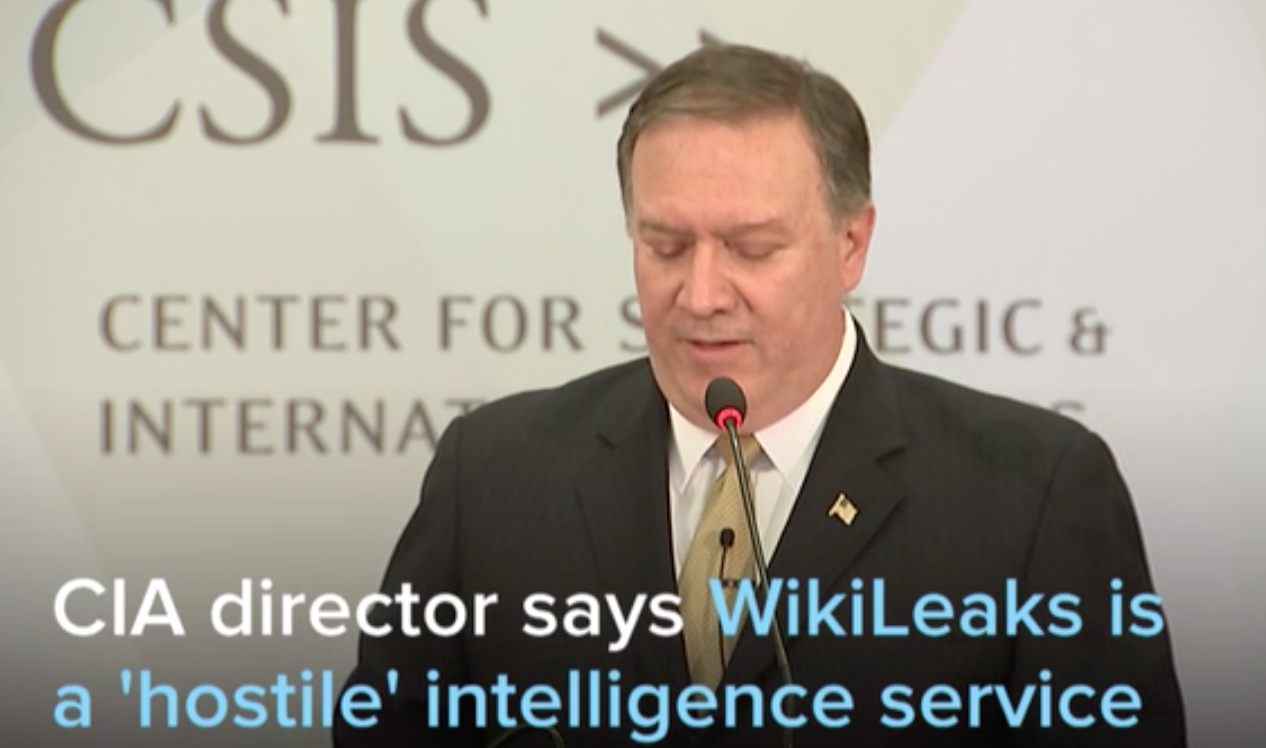
Mike Pompeo as CIA director calling WikiLeaks a nonstate hostile actor. (Screenshot)
Attorney General Jeff Sessions had accordingly stated that it was “a priority for the Justice Department” to arrest Julian Assange. He had pressured prosecutors in the Eastern District of Virginia to bring a case. In December 2017 an arrest warrant had been issued, with the indictment to be filled in later. The first indictment of a single count had been launched in March 2018, its timing possibly dictated by a limitation deadline.
In May 2019 a new superseding indictment increased the counts from one to 18, of which 17 related to espionage. This tougher stance followed the appointment of William Barr as attorney general just four months previously.
The plain intention of the first superseding indictment was to get around The New York Times problem by trying to differentiate Assange’s actions with Manning from those of other journalists.
It showed that the Justice Department was very serious and very aggressive in acting on the statements of Trump administration officials. Barr was plainly acting at the behest of Trump. This represented a clear abuse of the criminal enforcement power of the state.
The prosecution of a publisher in this way was unprecedented. Yet the facts were the same in 2018 as they had been in 2012 and 2013; there was no new evidence behind the decision to prosecute.
Crucially, the affidavits of U.S. Assistant Attorney Gordon Kromberg present no legal basis for the taking of a different decision to that of 2013. There is no explanation of why the dossier was lying around with no action for five or six years.
The Trump administration had in fact taken a different political decision through the presidential spokesperson Sarah Sanders who had boasted that only this administration had acted against Assange and “taken this process seriously.”
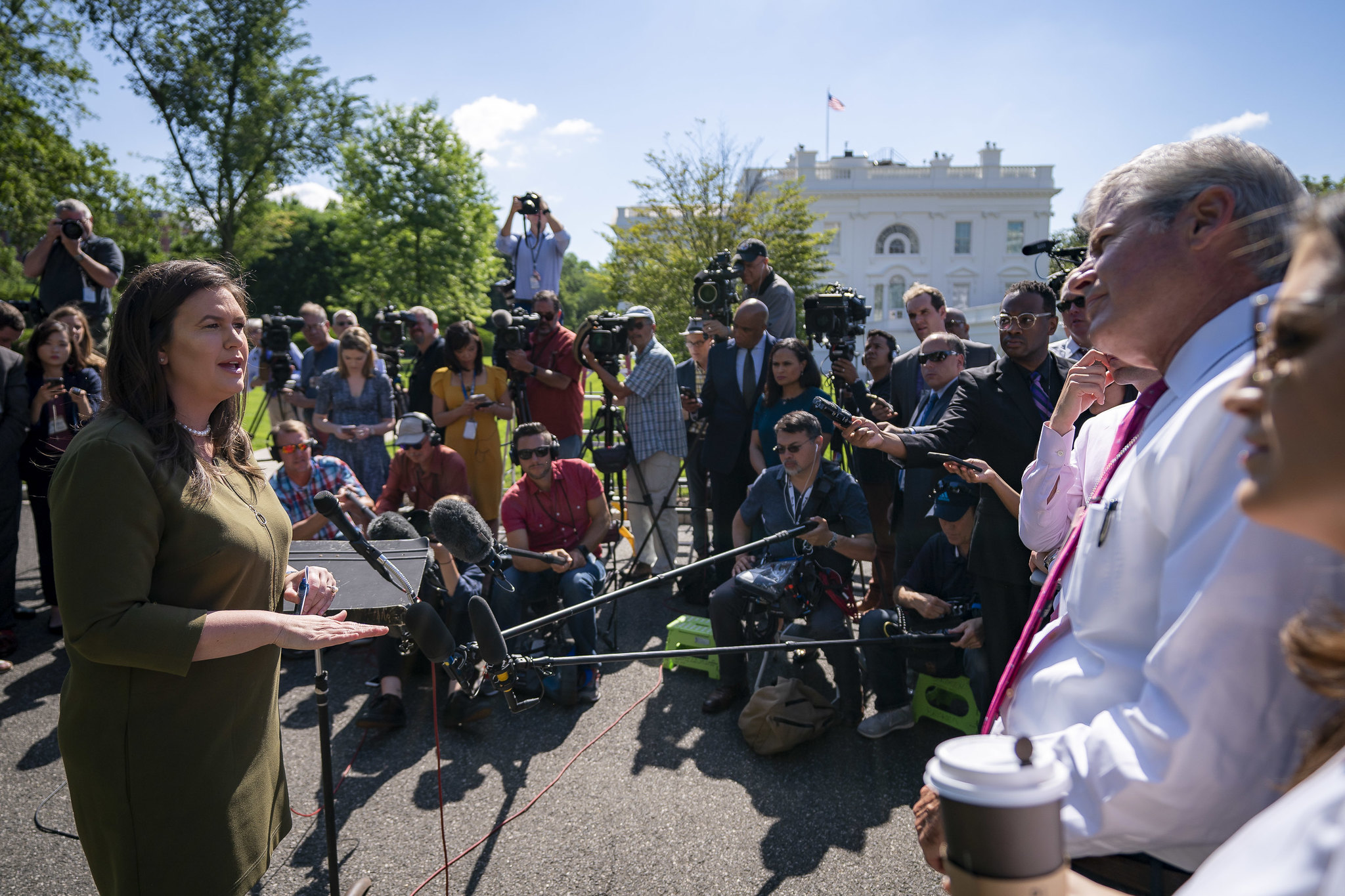
Former White House Press Secretary Sarah Huckabee Sanders speaking with reporters,May 31, 2019, outside the West Wing. (White House, Tia Dufour)
Question of Probable Sentencing
Edward Fitzgerald QC then turned to the question of probable sentencing and led Lewis through his evidence on this point.
Lewis confirmed that if Julian Assange were convicted he could very probably spend the rest of his life in prison. The charges had not been pleaded as one count, which it had been open to the prosecution to do. The judge would have discretion to sentence the counts either concurrently or consecutively. Under current sentencing guidelines, Assange’s sentence if convicted could range from “best case” 20 years to a maximum of 175 years. It was disingenuous of Gordon Kromberg to suggest a minimal sentence, given that Chelsea Manning had been sentenced to 35 years and the prosecution had requested 60.
It had been a government choice to charge the alleged offences as espionage. The history of espionage convictions in the USA had generally resulted in whole life sentences; 20-to-30 years had been lighter sentences for espionage. The multiple charges approach of the indictment showed a government intention to obtain a very lengthy sentence. Of course the final decision would lay with the judge, but it would be decades.
Detention Conditions
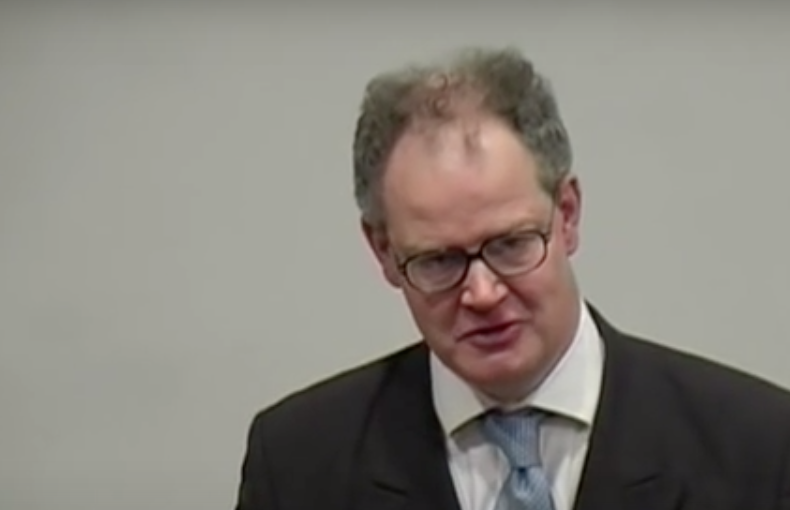
Edward Fitzgerald QC. (YouTube)
Assange’s attorney Edward Fitzgerald QC then led on to the question of detention conditions. On the question of remand, Gordon Kromberg, the U.S. assistant attorney, had agreed that Julian Assange would be placed in the Alexandria City Jail, and there was a “risk” that he would be held there under Special Administrative Measures, or SAMS.
In fact this was a near certainty. Assange faced serious charges related to national security, and had seen millions of items of classified information which the authorities would be concerned he might pass on to other prisoners. He would be subject to Special Administrative Measures both pre- and post-conviction.
After conviction Julian Assange would be held in the supermax prison ADX Florence, Colorado. There were at least four national-security prisoners currently there in the H block.
Under SAMS Assange would be kept in a small cell for 22 or 23 hours a day and not allowed to meet any other prisoners. He would be allowed out once a day for brief exercise or recreation excluded from other prisoners, but shackled.
Fitzgerald then led Lewis to the 2017 decision by the International Criminal Court to open an investigation into war crimes in Afghanistan, in which the evidence provided by the WikiLeaks release of U.S. war logs and diplomatic cables provided essential evidence.
This had been denounced by President Donald Trump, National Security Advisor John Bolton and Pompeo. The ICC prosecutor’s U.S. visa had been canceled to hinder the investigation. An Executive Order had been issued imposing financial sanctions and blocking the banking access of any non U.S. national who assisted the ICC investigation into crimes alleged against any U.S. citizen. This would affect Julian Assange.
At this point, the half-hour guillotine imposed by Judge Vanessa Baraitser on defence evidence came down. Fitzgerald pointed out they had not even reached the second superseding indictment yet, but Baraitser said that if the prosecution addressed that in cross examination, then the defence could question on it in re-examination.
Cross Examination
James Lewis QC then rose to cross examine Eric Lewis. Yet again, he adopted an extremely aggressive tone. This is perhaps best conveyed as a dialogue.
NB this is not a precise transcript. It would be illegal for me to publish a transcript (of a “public” court hearing; fascinating but true). This is condensed and slightly paraphrased. It is I believe a fair and balanced representation of what happened, but not a verbatim record.
Eric Lewis was appearing by videolink and it should be borne in mind that he was doing so at 5 a.m. his time.
James Lewis QC Are you retained as a lawyer by Mr. Assange in any way?
Eric Lewis No.
James Lewis QC Are you being paid for your evidence?
Eric Lewis Yes, as an expert witness. At a legal aid rate.
James Lewis QC Are you being paid for your appearance in this court?
Eric Lewis We haven’t specifically discussed that. I assume so.
James Lewis QC How much are you being paid?
Eric Lewis £100 per hour, approximately.
James Lewis QC How much have you charged in total?
Eric Lewis I don’t know, haven’t worked it out yet.
James Lewis QC Are you aware of the rules governing expert witnesses?
Eric Lewis Yes, I am. I must state my qualifications and my duty is to the court; I have to give an objective and unbiased view.
James Lewis QC You are also supposed to set out alternative views. Where have you set out the arguments in Mr. Kromberg’s five affidavits?
Eric Lewis The court has Mr. Kromberg’s affidavits. I address his arguments directly in my statements. Are you saying that I should have repeated his affidavits and all the other evidence in my statements? My statements would have been thousands of pages long.
James Lewis QC You are supposed to be unbiased. But you had previously given views that Mr. Assange should not be extradited.
Eric Lewis Yes, I published an article to that effect.
James Lewis QC You also gave an interview to an Australian radio station.
Eric Lewis Yes, but both of those were before I was retained as an expert witness in this case.
James Lewis QC Does this not create a conflict of interest?
Eric Lewis No, I can do an objective analysis setting aside any prejudice. Lawyers are used to such situations.
James Lewis QC Why had you not declared these media appearances as an interest?
Eric Lewis I did not think perfectly open actions and information needed to be declared.
James Lewis QC It would be much better if we were not forced to dig out this information. You give opinions on law. You also give opinions on penal conditions. Are you an expert witness?
Eric Lewis I am very familiar with prison conditions. I visit prisons. I studied criminology at Cambridge. I keep up to date with penology. I have taught aspects of it at university.
James Lewis QC Are you a qualified penologist?
Eric Lewis I think I have explained my qualification.
James Lewis QC Can you point us to peer reviewed articles which you have published on prison conditions?
Eric Lewis No.
James Lewis QC Have you visited ADX Colorado?

ADX Florence in Colorado. (Federal Bureau of Prisons, Wikimedia Commons)
Eric Lewis No, but I have had a professional relationship with a client in there.
James Lewis QC Have you represented anyone in Alexandria Detention Center?
Eric Lewis Yes, one person, Abu Qatada.
James Lewis QC So you have no expertise in prisons?
Eric Lewis I have visited extensively in prisons and observed prison conditions. I have read widely and in detail on the subject.
James Lewis QC Abu Qatada was acquitted of 14 of the 18 charges against him. Was that not acquittal by the same jury pool that would try Julian Assange?
Eric Lewis No. That was [the District of] Columbia, not Eastern Virginia. Very different jury pools.
James Lewis QC The prosecutors withdrew capital charges. You said that was a courageous but correct decision?
Eric Lewis Yes.
James Lewis QC So what was Qatada’s sentence and what was the maximum?
Eric Lewis The government asked for life but to my mind that was not legal for the charges on which he was convicted. He got 22 years. That was much criticised as harsh for those charges.

William G. Truesdale Adult Detention Center. (Alexandriava.gov website)
James Lewis QC Was the Abu Qatada trial a denial of justice?
Eric Lewis No.
James Lewis QC Abu Qatada was held under Special Administrative Measures. Did that prevent you from spending many hours with him?
Eric Lewis No, but it made it extremely difficult. The many hours were spread out over a long period. That is why remand lasted for three years.
James Lewis QC Were your meetings with him monitored?
Eric Lewis Yes.
James Lewis QC But not by the prosecution.
Eric Lewis It was all recorded by the authorities. We were told that nothing would be passed to the prosecution. But from many other reports I am not convinced that is true.
James Lewis QC What jury pool was Zacarias Moussaoui convicted by?
Eric Lewis He was not convicted by a jury. He pled guilty.
James Lewis QC But the jury decided against the death penalty.
Eric Lewis Yes.
James Lewis QC What about Maria Butina? She was charged with being an agent of the Russian Federation but received a light sentence?
Eric Lewis That was a very weird case. She did no more than cultivate some figures in the National Rifle Association. She was sentenced to time served.
James Lewis QC But she only got 18 months when the maximum was 20 years?
Eric Lewis Yes. It was not a comparable case, and it was a plea deal.
James Lewis QC You have addressed prison conditions because the defence argue that Article 3 of the European Convention on Human Rights will be breached. You consider the case of Babar Ahmed. You state that it is “almost certain” that Julian Assange will be subject to administrative segregation. What is the procedure for administrative segregation?
Eric Lewis The bureau president will decide depending upon various factors including security risk, threat to national security, threat to other prisoners, seriousness of the charge. My experience is that national-security-charged prisoners go straight into administrative segregation.
James Lewis QC (very aggressive) What are you reading?
Eric Lewis Pardon?
James Lewis QC You are reading something there. What is it?
Eric Lewis It is my witness statement. (Holds it up). Is that not OK?
James Lewis QC That is alright. I thought it was something else. How many categories of administrative detention are there?
Eric Lewis I just went through the main ones. National security, serious charge, threat to other prisoners.
James Lewis QC You do not know the categories. They are (reels off a long list including national security, serious charge, threat to others, threat to self, medical custody, protective custody and several more). Do you agree there is no solitary confinement in administrative segregation and Special Administrative Measures?
Eric Lewis No.
James Lewis QC U.S. Assistant Attorney Kromberg states in his affidavit that there is no solitary confinement
Eric Lewis It is solitary confinement other than in the vernacular of the U.S. prison service.
James Lewis QC In that case it is also not solitary confinement in the vernacular of the English High Court, which has accepted there is no solitary confinement.
Eric Lewis It is solitary confinement. When you are kept in a tiny cell for 23 hours a day and allowed no contact with the rest of the prison population even during the one hour you are allowed out, that is solitary confinement. The attempt to deny it is semantic.

Artist’s view of an ADX Florence cell design. (RicHard-59, CC BY-SA 3.0, Wikimedia Commons)
James Lewis QC Was Abu Qatada in solitary confinement? When he was permitted unlimited legal visits?
Eric Lewis They were not unlimited. In reality there were practical and logistical obstacles. There was a single room that could be used, for the entire prison population. You had to get a booking for that one room. You had to book translation services. The FBI oversaw the visits and listened in. Now with Covid there are no visits at all. Theoretically visits are “unlimited” but in practice you do not get nearly as much time with your client as you need.
James Lewis QC You said that he would be held in solitary confinement. But is it not true that even prisoners under SAMs get a break schedule?
Eric Lewis There is a break schedule but it requires no other prisoner to be in the communal areas to have contact with the prisoner under SAM. So in practice the “one hour break” would typically be scheduled between 3 a.m. and 4 a.m. Not many prisoners wanted to get out of bed at 3 a.m. to walk around a cold and empty communal area.
At this point there was a break.
Lewis Complains Forcefully
James Lewis QC used it forcefully to complain to Judge Baraitser about the four-hour limit set on his cross-examination of Eric Lewis.
He said that so far he had only got through one-and-a-half pages of his questions, and that Eric Lewis refused to give yes or no answers but instead insisted on giving lengthy explanations. James Lewis QC was plainly extremely needled by Eric Lewis’ explanations of “unlimited visiting time” and “no solitary confinement.” He complained that Baraitser was “failing to control the witness”.
It was plain that James Lewis’ real aim was not to get more time, but to get Baraitser to curtail Eric Lewis’s inconvenient answers. It is of course amazing that he was complaining about four hours when the defence had been limited to half-an-hour and had not even been permitted to get to the latest superseding indictment.
Baraitser, to her credit, replied that it was not for her to control the witness, who must be free to give his evidence so long as it was relevant, which it was. It was a question of fairness not of control. James Lewis was asking open or general questions.
James Lewis responded that the witness refused to give binary answers. Therefore his cross examination must be longer than four hours.
He became very heated and told Baraitser that never in his entire career had he been subject to a guillotine on cross examination, and that this “would not happen in a real court.” He very definitely said that:
“This would not happen in a real court.”
I have of course been arguing all along that this is not a genuine process. I did not expect to hear that from James Lewis QC, though I think his intention was just to bully Baraitser, which was confirmed by Lewis going on to state he had never heard of such a guillotine in his capacity of “high court judge.” I find that Lewis is listed as “deputy high court judge,” which I think is like being 12th man at cricket, or Gareth Bale.
Baraitser only conceded very slight ground under this onslaught, saying she had never used the word guillotine, that the timings had been agreed between parties, and she expected them to stick to them.
James Lewis said it was impossible in that way to adequately to represent his client (the U.S. government). He said he felt “stressed,” which for once seemed true, he had gone purple. Baraitser said he should try his best to stick to the four hours. He fumed away (though at a later stage apologised to Baraitser for his “intemperate language”).
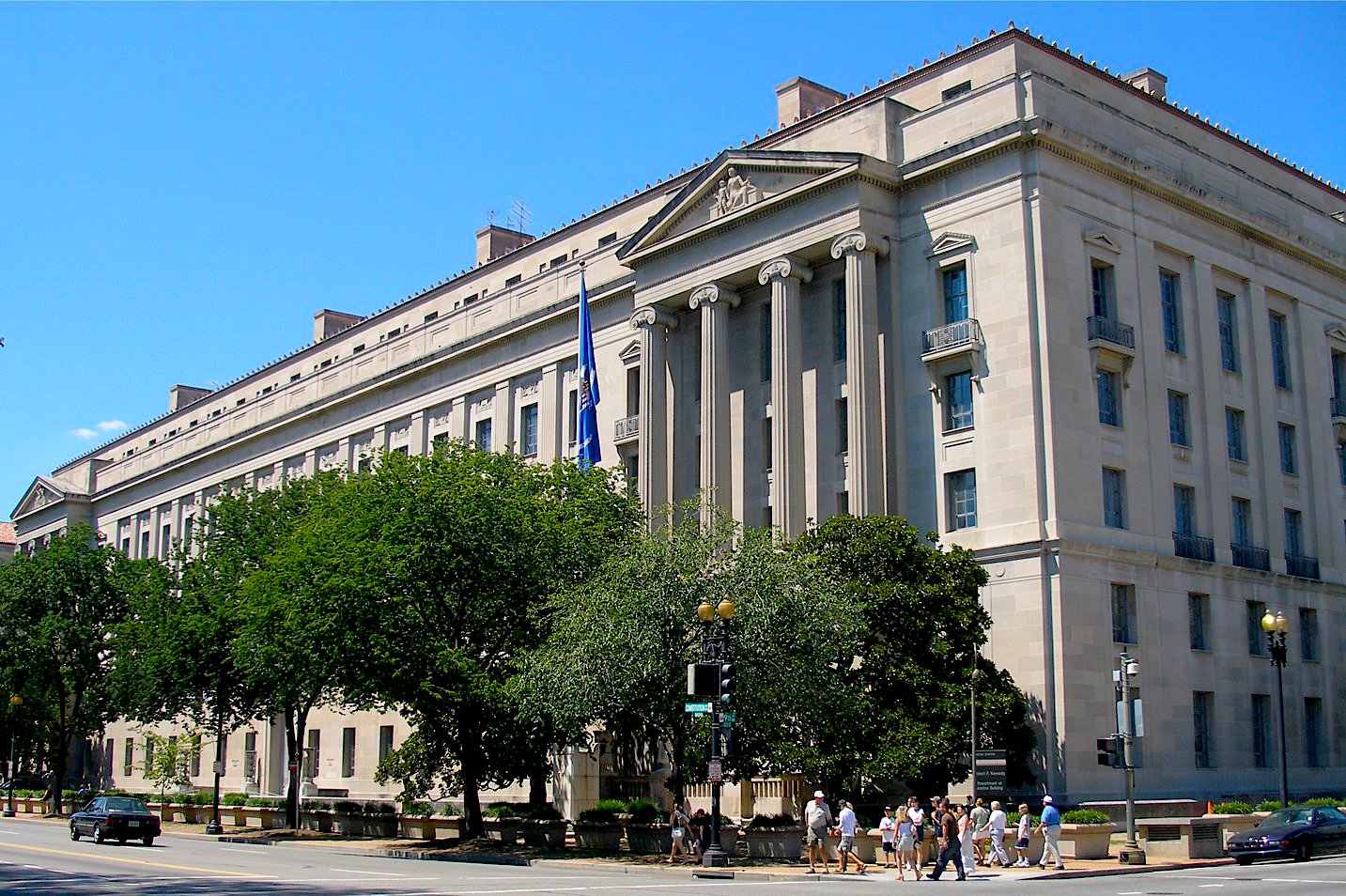
U.S. Department of Justice headquarters in Washington. (CC BY-SA 3.0, Wikimedia Commons)
James Lewis QC’s touting for business webpage describes him as “the Rolls Royce of advocates.” I suppose that is true, in the sense of foreign owned. Yet here he was before us, blowing a gasket, not getting anywhere, emitting fumes and resembling a particularly unloved Trabant.
Cross-examination of Eric Lewis resumed. James Lewis QC started by reiterating the criteria and categories for Administrative Segregation after conviction (as opposed to pre-trial). Then we got back into questioning.
James Lewis QC Gordon Kromberg states that there is no solitary confinement in ADX Colorado.
Eric Lewis Again this is semantic. There is solitary confinement.
James Lewis QC But there is an entitlement to participate in three programs a week.
Eric Lewis Not in Special Administrative Measures.
James Lewis QC But which of the criteria for Special Administrative Measures might Julian assange fall into?
Eric Lewis Criteria 2, 4 and 5, at least.
James Lewis QC Can we agree there is a formal procedure?
Eric Lewis Yes, but not worth the name.
James Lewis Your opinion is based on one single client in ADX Colorado
Eric Lewis Yes, but the system is essentially the same as other super-maxes.
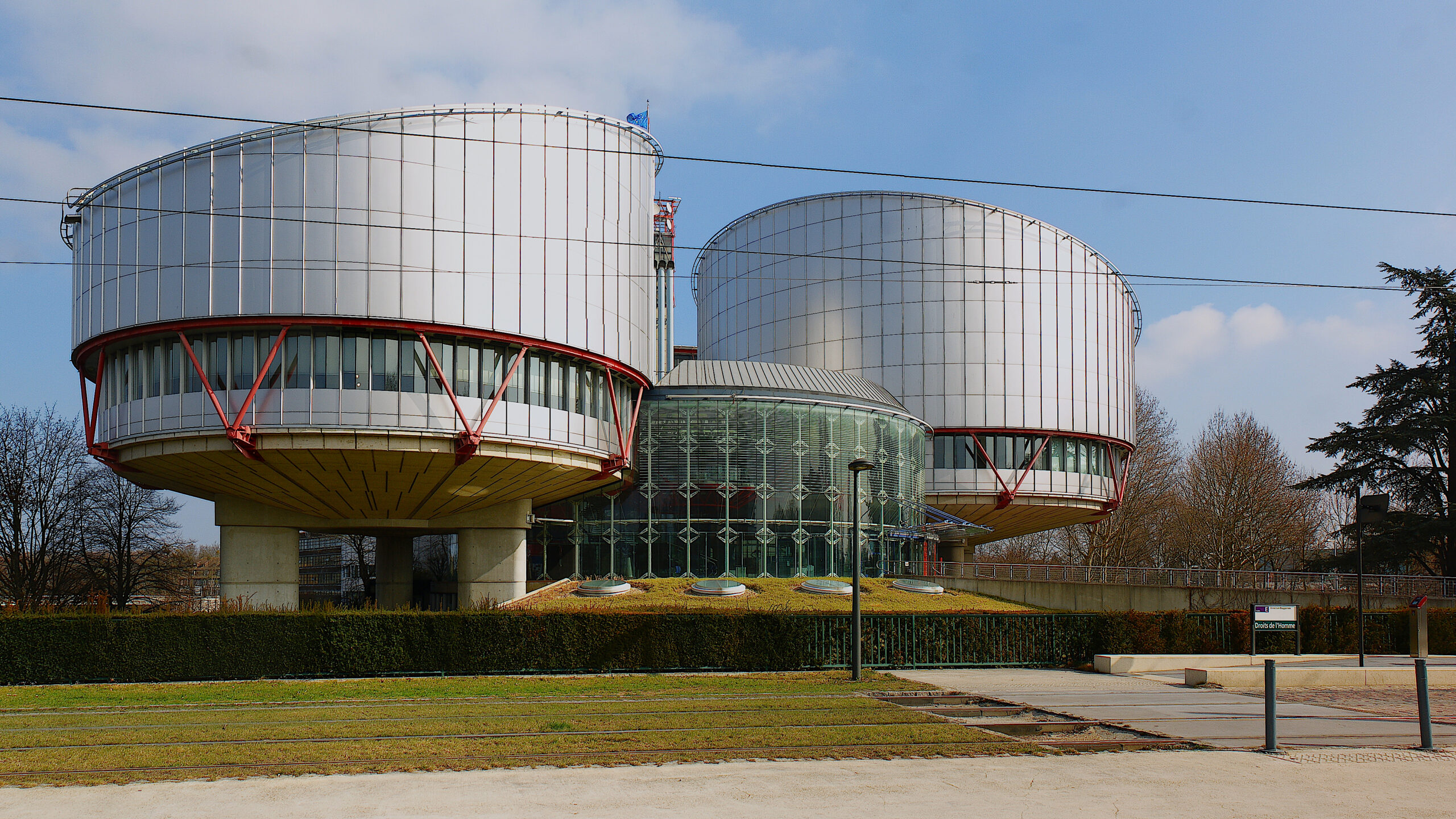
European Court of Human Rights building in Strasbourg, France. (CherryX, CC BY-SA 3.0, Wikimedia Commons)
James Lewis At para 14 of your report you state that the system lacks procedural rights, and is tantamount to solitary confinement. Had you read the Eurpopean Court of Human Rights judgement on Barbar Ahmed when you wrote this?
Eric Lewis Yes.
James Lewis That judgement specifically rejects the same claims you make.
James Lewis QC refers to a number of paragraphs in the original U.K. district court decision in the case of Babar Ahmad. Eric Lewis asks for more time to find the document as “I only received these documents from the court this morning.”
James Lewis QC But Mr. Lewis, you have testified on oath that you had read the Babar Ahmad judgement.
Eric Lewis I have read the final judgement of the European Court of Human Rights. I had not read all the judgements from lower courts. I received them from the court his morning.
James Lewis QC The senior district judge ruled that although Special Administrative Measures were a concern, they did not preclude extradition. There were various safeguards to SAMs. For example although attorney/client conversations were monitored, that was only for the purpose of preventing terrorism and the FBI did not pass on the recordings to the prosecution. The judge rejected the idea that SAMs amounted to solitary confinement. The High Court upheld the District judge’s ruling and the House of Lords rejected Babar Ahmad’s application to appeal. In its ruling on admissibility of the case, the European Court of Human Rights considered six affidavits from U.S. attorneys very similar to that submitted by Eric Lewis in this case. This included the affirmations that it would be “virtually certain” that Babar Ahmad would be subject to SAMs, and that these would interfere directly with the right to a fair trial, and would constitute cruel and degrading treatment. The ECHR found in relation to pre-trial detention that these allegations were wrong in the Babar Ahmad case.
Eric Lewis But that was a terrorism case, not a national security case. SAMs apply differently in national security cases. This is about a million classified documents. Different cases had to be considered each on their merits.
James Lewis QC In the Babar Ahmad case, the defence submissions were that the regime was harsh, amounted to solitary confinement nearly 24 hours a day, with one phone call every two weeks and one family visit a month. Is that not almost identical to your evidence here?
Eric Lewis Each case must be considered on its merits. There are key differences. Assange is charged with espionage not terrorism, and possession of classified intelligence is a factor. Mental health issues are also different. Under SAMS there is no intenet access and no access to any news source. Only approved reading material is allowed. These would be particularly hard for Assange.
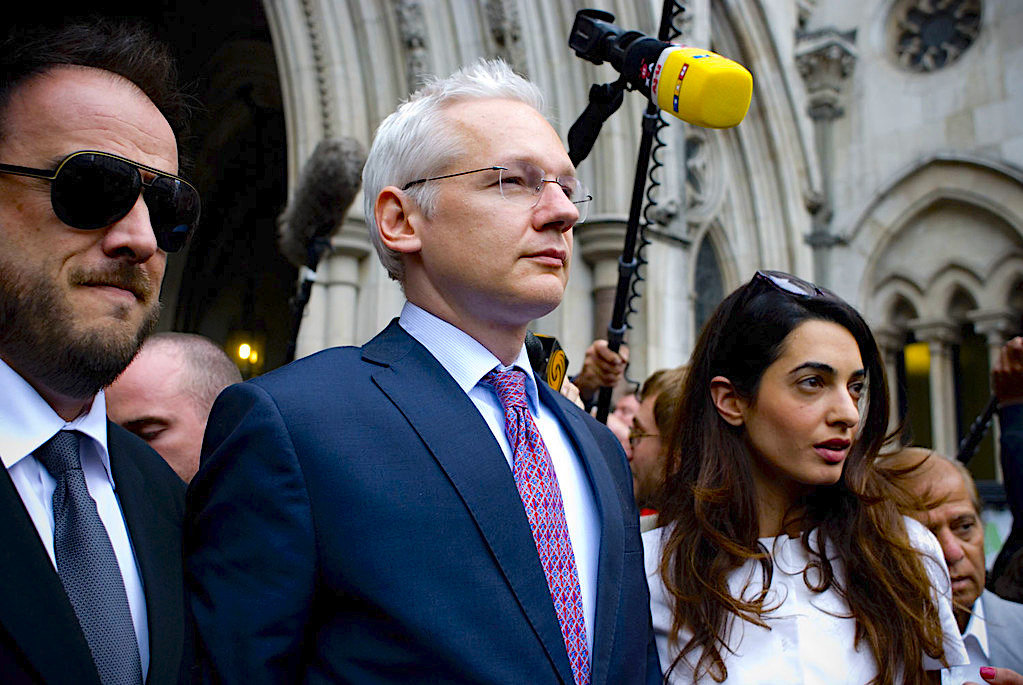
Julian Assange outside U.K. Supreme Court in 2011. (Flickr)
James Lewis QC But the Babar Ahmad case does specifically deal with mental-health issues, between Babar and co-defendants these include clinical depression, suicide risk and Asperger’s. The court agreed that SAMs would be likely to be applied both before and after trial. But it ruled that the American government had good reasons for imposing SAMs, were entitled to do so, and that there was a clear and non-arbitrary procedure for implementing them.
Eric Lewis replied that he disagreed that would be true in this case. SAM’s could be applied without procedure, by the U.S. Attorney-General and William Barr would do that in this case, on the basis of statements by Trump and Gina Haspel [CIA director]. In practice, SAMs had never been overturned whatever the claimed procedure. Eric Lewis did not agree they were not arbitrary.
There now followed an episode where James Lewis QC successfully tripped up Eric Lewis by quoting a passage from an Ahmad case judgement and then confusing him as to whether it was from the final ECHR judgement, which Eric Lewis had read, or from an earlier English court judgement or the ECHR prior judgement on admissibility, which he had not.
James Lewis QC So the ECHR viewed the argument that the SAM regime in pre-trial detention breaches Article 3 as ill-founded and inadmissible. Do you agree with the European Court of Human Rights?
Eric Lewis They found that in the Babar Ahmad admissibility decision in 2008. New information and evidence and changes to the regime since then might change that view.
James Lewis QC What are the defence issues that Assange will raise that you say makes proper consultation under the SAM regime impossible?
Eric Lewis Well I don’t know the precise details of what his defence will be but…
James Lewis QC [interrupting] Well how can you possibly know what the issues will be if you do not know the case?
Eric Lewis Because I have read the indictment. The issues are very wide ranging indeed and involve national security documents.
James Lewis QC But you don’t know what defence at all will be put forward, so how can you opine?
Eric Lewis The charges themselves give a fair idea what might be covered.
James Lewis QC Turning to the Babar Ahmad final judgement on post-trial incarceration at ADX Colorado. Have you read this (sarcastic emphasis) judgement? Of 210,307 federal prisoners, only 41 of these had SAMs; 27 were in ADX Colorado.
Eric Lewis The warden of ADX Colorado himself had stated that it was “not fit for humanity” and “a fate worse than death.”
James Lewis QC The ECHR said that SAMS was subject to oversight by independent authorities who looked after the interests of prisoners and could intervene.
Eric Lewis Since that ECHR judgement, a new U.S. judgement had stated that prisoners have no Fifth Amendment right to appeal against the conditions of their incarceration.
James Lewis QC The ECHR found that the U.S. prison authorities took cognizance of a prisoner’s mental state in relation to SAM measures
Eric Lewis Things have also moved on there since 2012. He referenced details from his written evidence.
James Lewis QC The ECHR also found that “the isolation experienced by ADX inmates is partial and relative. The court notes that their psychiatric conditions have not prevented their high security detention in the United Kingdom.” Do you accept that in 2012 the ECHR made a thorough finding?
Eric Lewis Yes, on the basis of what they knew in 2012, but much more information is now available. And there are specific reasons to doubt Mr. William Barr’s impartiality.
James Lewis QC You say that Mr. Assange will not receive adequate healthcare in a U.S. prison. Are you a medical expert?
Eric Lewis No.
James Lewis QC Do you hold any medical qualification?
Eric Lewis No.
James Lewis QC What published statement gives the policy of the Bureau of Prisons on Mental Health?
Eric Lewis I was relying on the published statement of the U.S. inspector of prisons and the study by Yale Law School of mental health in U.S. prisons. The U.S. Bureau of Prisons states that 48 percent of prisoners have serious mental-health problems but only 3 percent receive any treatment. The provision for mental healthcare in jails has been cut every year for a decade. Suicides in jail are increasing by 18 percent a year.
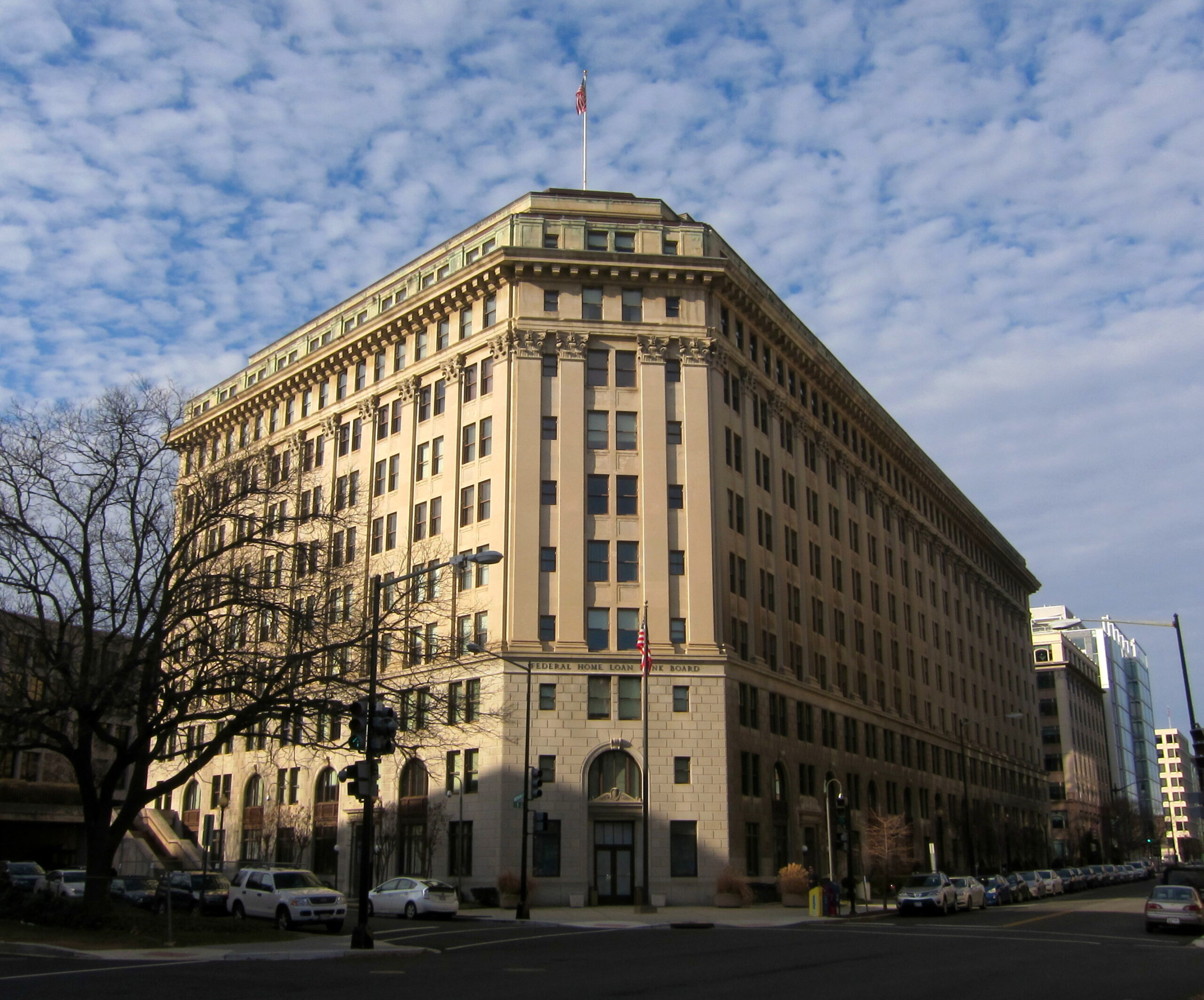
The Federal Home Loan Bank Board Building, which houses the main office of the Federal Bureau of Prisons in Washington, D.C. (AgnosticPreachersKid, CC BY-SA 4.0, Wikimedia Commons)
James Lewis QC Have you read “The Treatment and Care of Prisoners with Mental Illness” by the U.S. Department of Health?
Eric Lewis Yes.
James Lewis QC You purport to be an expert. Without looking it up what year was it published? You don’t know, do you?
Eric Lewis Could you be courteous? I have been courteous to you. Can you refer me to a relevant question?
James Lewis QC The policy has had eight changes since 2014. Can you list them?
Eric Lewis I am trying to testify on my experience and my knowledge in dealing with these questions on behalf of the many clients I have represented. If you are asking me am I a prison psychiatrist, I am not.
James Lewis QC Do you know the specific changes made since 2014 or not?
Eric Lewis I know that there were new regulations stipulating one mental-health professional for every 500 inmates and guidelines for an increase in accessibility, but I also know those have not in fact been implemented due to lack of resources.
James Lewis QC (smirking) How many levels of psychiatric assessment are there? What is level number three? What are you reading? You are reading! What are you reading! What are you reading! [Yes, this is not a mistake. He did pull this stunt again]
Eric Lewis I am looking at my own witness statement (shows it to camera).
James Lewis QC You are not a genuine expert witness you have no expertise in these matters. As you are being paid to give evidence and are not an expert, that is something the court will have to take account in deciding what weight, if any at all, to give to your evidence.
Before Eric Lewis could respond, the video link broke down, rather bizarrely broadcasting a news item about Trump attacking Julian Assange. It could not be restored all day, so that was the end of proceedings, for which my note-taking hand was not ungrateful. The link could be restored in the adjacent courtroom, which indicates the problem was very local. The judge considered changing courts but it was considered too difficult to move everyone and the great mounds of files and equipment. This hearing has frequently been interrupted by the strange incompetence of the Ministry of Justice in establishing simple video links.
Strange Conduct
James Lewis QC’s conduct was very strange. It really is not normal courtroom behavior. Were there a jury, they would completely have written him off now as rude and obnoxious, and even Baraitser finally seems to have found her limit of being pushed around by the prosecution. Eric Lewis is obviously a very distinguished man and a lawyer with immense experience of the U.S. system. Trying to claim he has no expertise because he is not a psychiatrist or an academic in penology is no more than a shoddy trick, performed in a manner designed to humiliate.
The asking for the precise title of one particular Department of Health pamphlet or for a specific point in it, as though that were a way of invalidating all that Eric Lewis knows, is so transparently invalid as a test of worth that I am astonished Baraitser let James Lewis pursue it, let alone the histrionic accusations about “reading.”
This was really hard to sit through silently for me; goodness knows what it was like for Julian.
Mainstream Media’s Blind Eye
The mainstream media are turning a blind eye. There were three reporters in the press gallery, one of them an intern and one representing the National Union of Journalists. [Update: James Doleman later led me to another hidden nest of them and there are about 10 in total. The main titles are inexcusably unrepresented, but press agencies are, even if their feeds are being little used.]
Public access continues to be restricted and major NGOs, including Amnesty, PEN and Reporters Without Borders, continue to be excluded both physically and from watching online. It has taken me literally all night to write this up — it is now 8.54am — and I have to finish off and get back into court.
The six of us allowed in the public gallery, incidentally, have to climb 132 steps to get there, several times a day. As you know, I have a very dodgy ticker; I am with Julian’s dad John Shipton who is 78; and another of us has a pacemaker.
I do not in the least discount the gallant efforts of others when I explain that I feel obliged to write this up, and in this detail, because otherwise the vital basic facts of the most important trial this century, and how it is being conducted, would pass almost completely unknown to the public.
If it were a genuine process, they would want people to see it, not completely minimise attendance both physically and online.
Forgive me for pointing out that my ability to provide this coverage is entirely dependent on your kind voluntary subscriptions which keep this blog going. This post is free for anybody to reproduce or republish, including in translation.
Unlike our adversaries including the Integrity Initiative, the 77th Brigade, Bellingcat, the Atlantic Council and hundreds of other warmongering propaganda operations, this blog has no source of state, corporate or institutional finance whatsoever. It runs entirely on voluntary subscriptions from its readers – many of whom do not necessarily agree with the every article, but welcome the alternative voice, insider information and debate.
Craig Murray is an author, broadcaster and human rights activist. He was British ambassador to Uzbekistan from August 2002 to October 2004 and rector of the University of Dundee from 2007 to 2010.
This article is from CraigMurray.org.uk.
The views expressed are solely those of the author and may or may not reflect those of Consortium News.
Please Contribute to Consortium News’
25th Anniversary Fall Fund Drive
Donate securely with
Click on ‘Return to PayPal’ here.
Or securely by credit card or check by clicking the red button:

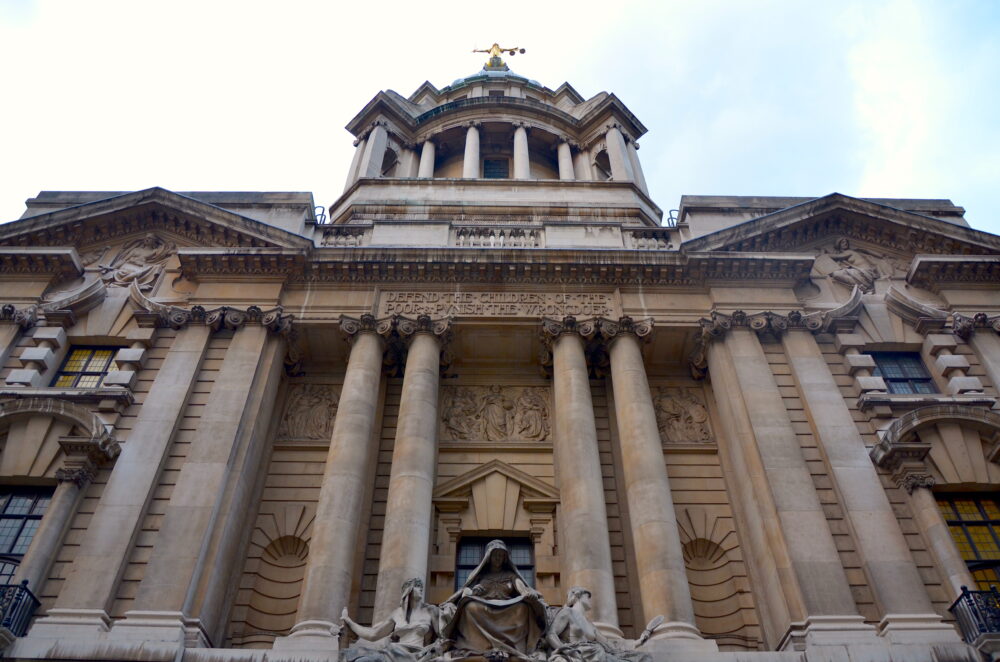


Lady Justice must be weeping hysterically.
We are prosecuting the wrong man – We need to be prosecuting war criminals such as Barrack Obama, Joe Biden, Donald Trump, Hillary Clinton, Madeleine Albright, William J Clinton, George W Bush, Dick Cheney, Donald Rumsfeld, Colin Powell and Henry Kissinger – just name a few. This trial of Julian Assange is a complete and total farce!